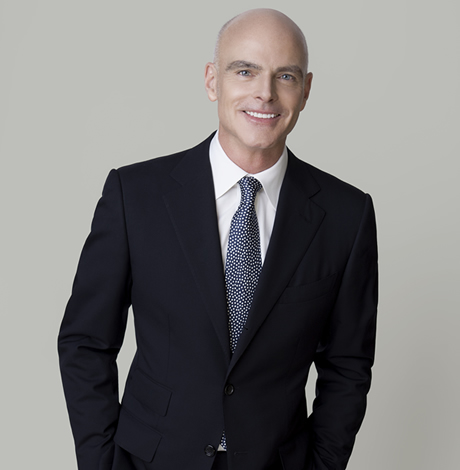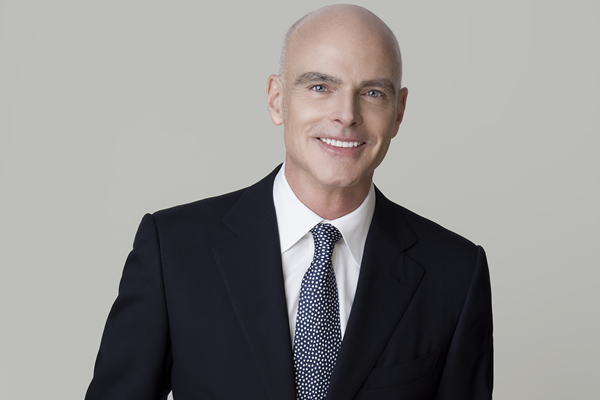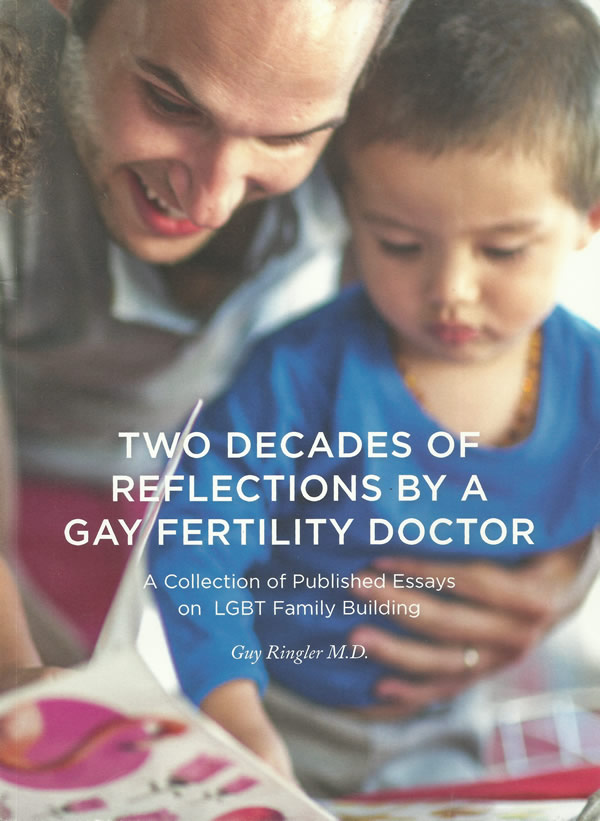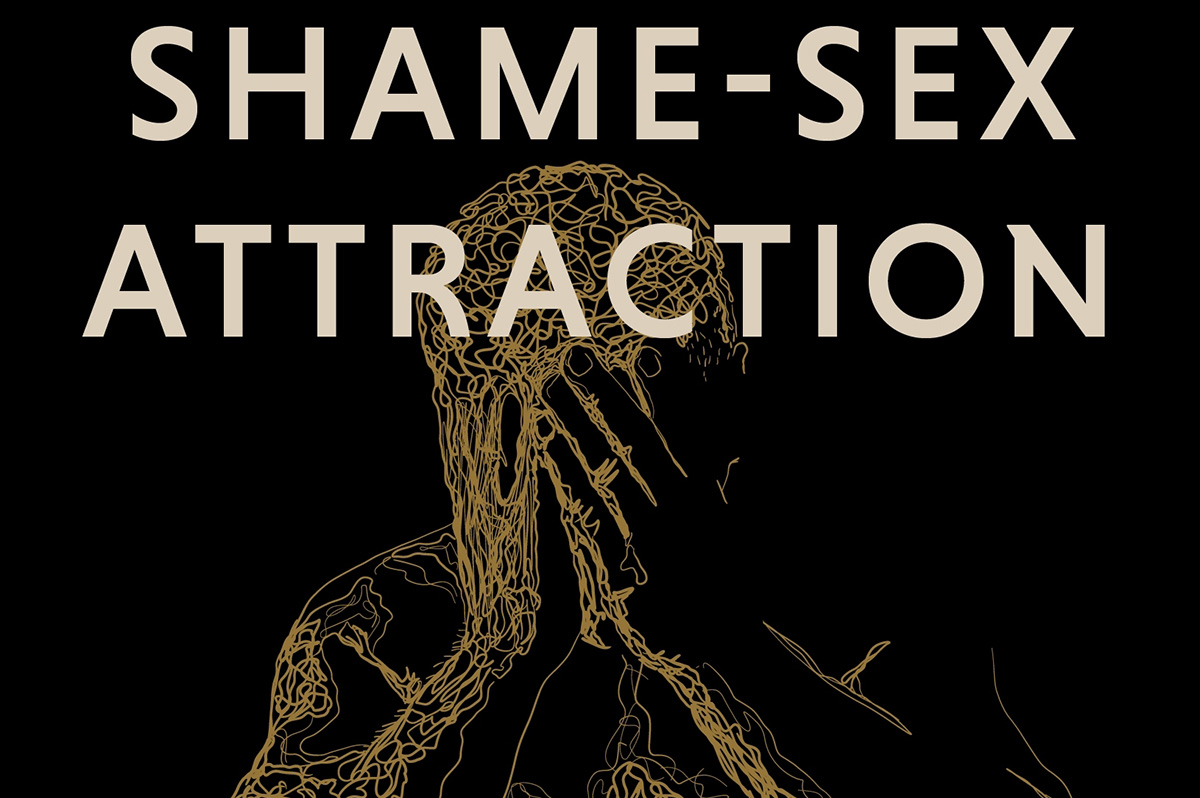Books
Fertility doc shares 20 years of experience helping gay couples conceive
Issues, challenges vary for gay, lesbian, poz and trans folks hoping to parent


Dr. Guy Ringler says fertility issues for same-sex couples have changed dramatically over the last 20 years. (Photo courtesy Ringler)
Guy Ringler, a gay fertility doctor, started writing a few years ago as a way to explore a personal hobby but also to share the wealth of information he’s amassed in 20-plus years of helping couples conceive.
“I felt it was very important to give back and by sharing these stories and this information, it was a way to give back not only to the LGBT community, but also so other people could learn about gay family building and how normal it is,” the 61-year-old Ringler, in practice in Los Angeles for 27 years at California Fertility Partners, says. “What’s really fascinating is the surrogates, who basically give a year of their lives, they often come from small towns and they tell me they’ll be in the grocery store and people are shocked to hear they’re a surrogate and even more shocked they’re doing it for a gay couple so they’re really helping to educate others that it’s OK and right and everyone deserves the right to have a family. We’re seeing lots of change in positive ways.”
About four years ago, Ringler — gay himself but not a parent — started having his columns published in outlets such as The Advocate, Huffington Post, LGBTQ Nation, for GLAAD and more. Titles ranged from “Gay Fertility Doctor on Twenty Years of Helping to Build LGBT Families” (GLAAD, June 2015) to “What I really Want for Christmas: How to Tell Your Family You’re Having Kids” (Huffington Post, Dec. 2014), “Why Trans People Should take a Pregnant Pause Before Transitioning” (LGBTQ Nation, Nov. 2016), “Poz People Can Still Have the Family They Have Always Dreamed Of” (The Advocate, Nov. 2014) and several more.
Earlier this year, Ringler self-published the columns in a booklet called “Two Decades of Reflections by a Gay Fertility Doctor.” He’s selling copies for $9.99 on eBay.
Ringler says family planning for LGBT couples has made — as one would expect — enormous strides in the last 20 years. He writes of the first same-sex male couple who consulted with him on starting their family about 20 years ago wanting their child to be a “mix of their genetics.” They were able to do so, Ringler writes, by harvesting eggs from one partner’s sister and fertilizing them with sperm of his partner. “Everything worked out wonderfully,” he writes.
Ringler says he now sees greater diversity of ages in his clients and people from different parts of the world. One whole section of the book is devoted to “LGBT Family Building Around the World,” where he writes of his work in China, Japan, Spain and more.
“Fortunately with growing societal acceptance, there are many more options and more clinics are opening their doors,” Ringler says.

A new booklet by Dr. Guy Ringler collects essays he’s written on IVF, gay parenting and more. (Photo courtesy Ringler)
Books
Chronicling disastrous effects of ‘conversion therapy’
New book uncovers horror, unexpected humor of discredited practice

‘Shame-Sex Attraction: Survivors’ Stories of Conversion Therapy’
By Lucas F. W. Wilson
c.2025, Jessica Kingsley Publishers
$21.95/190 pages
You’re a few months in, and it hasn’t gotten any easier.
You made your New Year’s resolutions with forethought, purpose, and determination but after all this time, you still struggle, ugh. You’ve backslid. You’ve cheated because change is hard. It’s sometimes impossible. And in the new book, “Shame-Sex Attraction” by Lucas F. W. Wilson, it can be exceptionally traumatic.

Progress does not come without problems.
While it’s true that the LGBTQ community has been adversely affected by the current administration, there are still things to be happy about when it comes to civil rights and acceptance. Still, says Wilson, one “particularly slow-moving aspect… has been the fight against what is widely known as conversion therapy.”
Such practices, he says, “have numerous damaging, death-dealing, and no doubt disastrous consequences.” The stories he’s collected in this volume reflect that, but they also mirror confidence and strength in the face of detrimental treatment.
Writer Gregory Elsasser-Chavez was told to breathe in something repellent every time he thought about other men. He says, in the end, he decided not to “pray away the gay.” Instead, he quips, he’d “sniff it away.”
D. Apple became her “own conversation therapist” by exhausting herself with service to others as therapy. Peter Nunn’s father took him on a surprise trip, but the surprise was a conversion facility; Nunn’s father said if it didn’t work, he’d “get rid of” his 15-year-old son. Chaim Levin was forced to humiliate himself as part of his therapy.
Lexie Bean struggled to make a therapist understand that they didn’t want to be a man because they were “both.” Jordan Sullivan writes of the years it takes “to re-integrate and become whole” after conversion therapy. Chris Csabs writes that he “tried everything to find the root of my problem” but “nothing so far had worked.”
Says Syre Klenke of a group conversion session, “My heart shattered over and over as people tried to console and encourage each other…. I wonder if each of them is okay and still with us today.”
Here’s a bit of advice for reading “Shame-Sex Attraction”: dip into the first chapter, maybe the second, then go back and read the foreword and introduction, and resume.
The reason: author Lucas F. W. Wilson’s intro is deep and steep, full of footnotes and statistics, and if you’re not prepared or you didn’t come for the education, it might scare you away. No, the subtitle of this book is likely why you’d pick the book up so because that’s what you really wanted, indulge before backtracking.
You won’t be sorry; the first stories are bracing and they’ll steel you for the rest, for the emotion and the tears, the horror and the unexpected humor.
Be aware that there are triggers all over this book, especially if you’ve been subjected to anything like conversion therapy yourself. Remember, though, that the survivors are just that: survivors, and their strength is what makes this book worthwhile. Even so, though “Shame-Sex Attraction” is an essential read, that doesn’t make it any easier.
The Blade may receive commissions from qualifying purchases made via this post.
Books
How one gay Catholic helped change the world
‘A Prince of a Boy,’ falls short of author’s previous work

Brian McNaught, the pioneering gay activist and author of 1986’s “On Being Gay” and 1993’s “Gay Issues in the Workplace,” has written a personal account about his Catholic faith and homosexuality. It is a memoir without much substance.
“A Prince of a Boy: How One Gay Catholic Helped Change the World” (Cascade Books) is a strong personal statement by McNaught. He helped change family relationships. He helped change attitudes about homosexuality. He helped change workplaces, but the world?

In January 2023, the Catholic News Service reported that Pope Francis announced that, “being homosexual is not a crime.” In December 2023, NPR reported that Pope Francis approved “Catholic blessings for same-sex couples, but not for marriage.” Francis died Monday at age 88. Although Catholics may not see homosexuality as a crime, they see sex outside of marriage as a sin. They see same-sex marriage as a sin.
In 2021, Gallup reported that membership in the Catholic Church had declined 20 percent since 2000. In 2025, the Pew Research Center’s Religious Landscape Study found that nearly 40 percent of Americans identified as Protestant, while the same study found that only 19 percent identified as Catholic.
McNaught devotes much of his book to his life as a gay Catholic. It is challenging to read about his personal struggle. Some readers may find it interesting. Others might find it boring. Catholic readers may find it more compelling than Protestant readers.
As the above statistics prove, McNaught has much more work to do to change the Catholic Church’s views about homosexuality. We should be glad for his contribution to the debate within the Catholic Church. We should pray for full acceptance of gays in the Catholic Church.
“A Prince of a Boy” becomes more interesting when McNaught describes his work as an educator on LGBTQ issues. He has had an impact on workplace policies, academic programs, and public education, and his lectures, books, and other materials are widely used.
Based on my experience in the federal government and volunteering with LGBTQ organizations from the Bay Area to Washington, D.C., I believe McNaught’s work as an educator has improved LGBTQ lives, careers, and families. During the Clinton administration, I gave many copies of “Gay Issues in the Workplace” to personnel directors. I felt their staff could benefit from reading it. I thought it would help the lives and careers of my federal LGBTQ colleagues.
McNaught’s “A Prince of a Boy” was released in December 2024. Anti-gay crusader Anita Bryant died the same month. Bryant campaigned against a gay rights law in Florida. She began a national campaign against gays.
When Bryant successfully reversed a gay rights ordinance in Dade County, Florida, McNaught wrote the important essay “Dear Anita, Late Night Thoughts of an Irish Catholic Homosexual.” The essay is not in “A Prince of a Boy”; however, McNaught mentions Bryant.
In his training programs, McNaught describes homosexuals as journeying from confusion to denial to acceptance to pride. “Anita Bryant and AIDS brought Gay people to identity pride very quickly,” McNaught writes. San Francisco Supervisor Harvey Milk (1930-1978) and other activists reached similar conclusions about Bryant’s vicious anti-gay campaign.
McNaught helped change the LGBTQ world and brought pride to many people’s lives. McNaught walks in pride, works in pride, and educates others in pride.
“A Prince of a Boy” is a disappointing book. It provides small details about Brian McNaught’s large, proud life. A meaningful biography about this great gay leader is long overdue.
The Blade may receive commissions from qualifying purchases made via this post.
Books
‘Pronoun Trouble’ reminds us that punctuation matters
‘They’ has been a shape-shifter for more than 700 years

‘Pronoun Trouble’
By John McWhorter
c.2025, Avery
$28/240 pages
Punctuation matters.
It’s tempting to skip a period at the end of a sentence Tempting to overuse exclamation points!!! very tempting to MeSs with capital letters. Dont use apostrophes. Ask a question and ignore the proper punctuation commas or question marks because seriously who cares. So guess what? Someone does, punctuation really matters, and as you’ll see in “Pronoun Trouble” by John McWhorter, so do other parts of our language.

Conversation is an odd thing. It’s spontaneous, it ebbs and flows, and it’s often inferred. Take, for instance, if you talk about him. Chances are, everyone in the conversation knows who him is. Or he. That guy there.
That’s the handy part about pronouns. Says McWhorter, pronouns “function as shorthand” for whomever we’re discussing or referring to. They’re “part of our hardwiring,” they’re found in all languages, and they’ve been around for centuries.
And, yes, pronouns are fluid.
For example, there’s the first-person pronoun, I as in me and there we go again. The singular I solely affects what comes afterward. You say “he-she IS,” and “they-you ARE” but I am. From “Black English,” I has also morphed into the perfectly acceptable Ima, shorthand for “I am going to.” Mind blown.
If you love Shakespeare, you may’ve noticed that he uses both thou and you in his plays. The former was once left to commoners and lower classes, while the latter was for people of high status or less formal situations. From you, we get y’all, yeet, ya, you-uns, and yinz. We also get “you guys,” which may have nothing to do with guys.
We and us are warmer in tone because of the inclusion implied. She is often casually used to imply cars, boats, and – warmly or not – gay men, in certain settings. It “lacks personhood,” and to use it in reference to a human is “barbarity.”
And yes, though it can sometimes be confusing to modern speakers, the singular word “they” has been a “shape-shifter” for more than 700 years.
Your high school English teacher would be proud of you, if you pick up “Pronoun Trouble.” Sadly, though, you might need her again to make sense of big parts of this book: What you’ll find here is a delightful romp through language, but it’s also very erudite.
Author John McWhorter invites readers along to conjugate verbs, and doing so will take you back to ancient literature, on a fascinating journey that’s perfect for word nerds and anyone who loves language. You’ll likely find a bit of controversy here or there on various entries, but you’ll also find humor and pop culture, an explanation for why zie never took off, and assurance that the whole flap over strictly-gendered pronouns is nothing but overblown protestation. Readers who have opinions will like that.
Still, if you just want the pronoun you want, a little between-the-lines looking is necessary here, so beware. “Pronoun Trouble” is perfect for linguists, writers, and those who love to play with words but for most readers, it’s a different kind of book, period.
The Blade may receive commissions from qualifying purchases made via this post.
-

 District of Columbia5 days ago
District of Columbia5 days agoD.C. police seek help in identifying suspect in anti-gay threats case
-

 Virginia2 days ago
Virginia2 days agoYoungkin calls on gay Va. GOP LG candidate to exit race over alleged ‘porn’ scandal
-

 Opinions5 days ago
Opinions5 days agoOn Pope Francis, Opus Dei and ongoing religious intolerance
-

 Commentary4 days ago
Commentary4 days agoA conversation about queers and class






